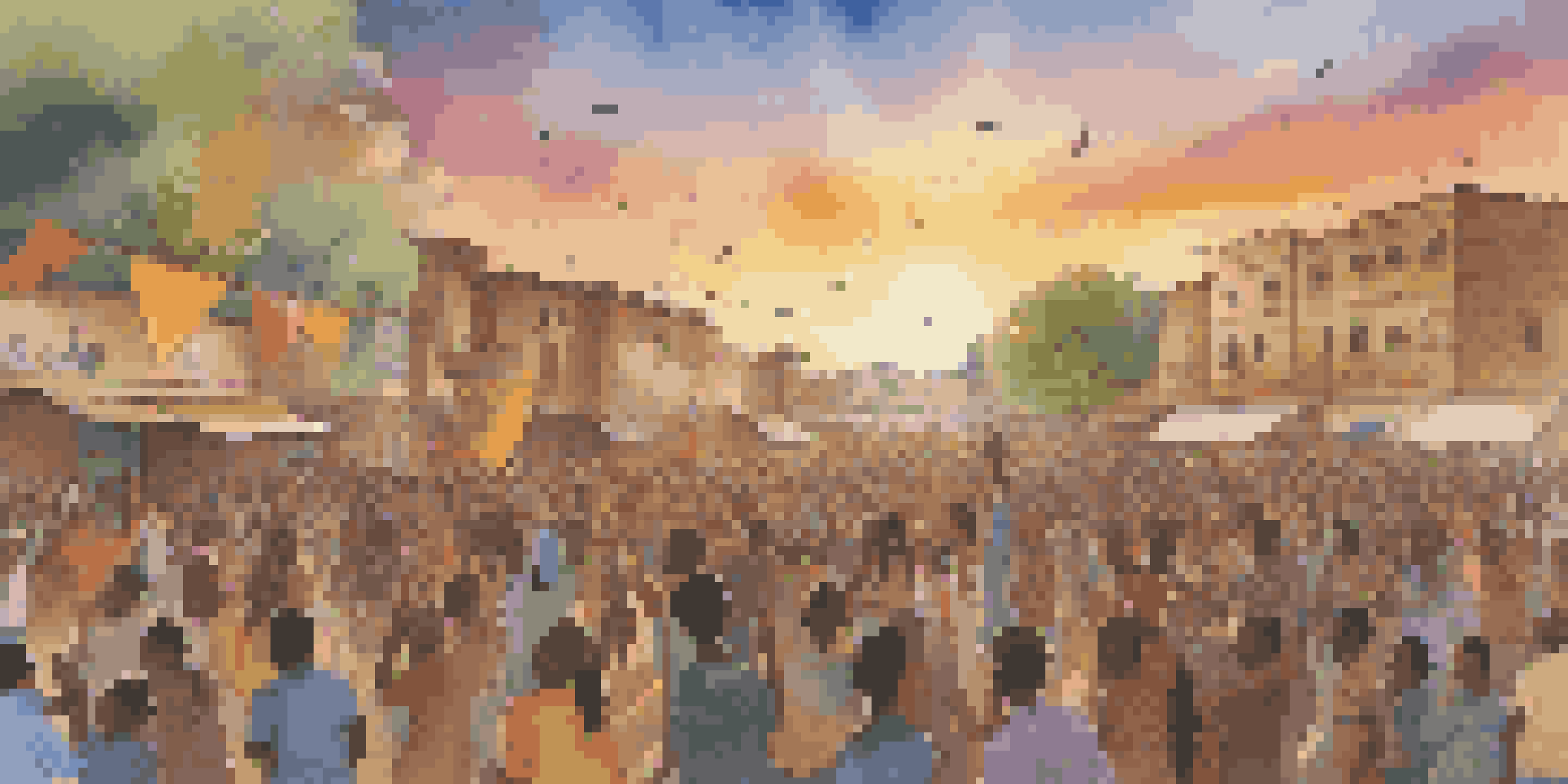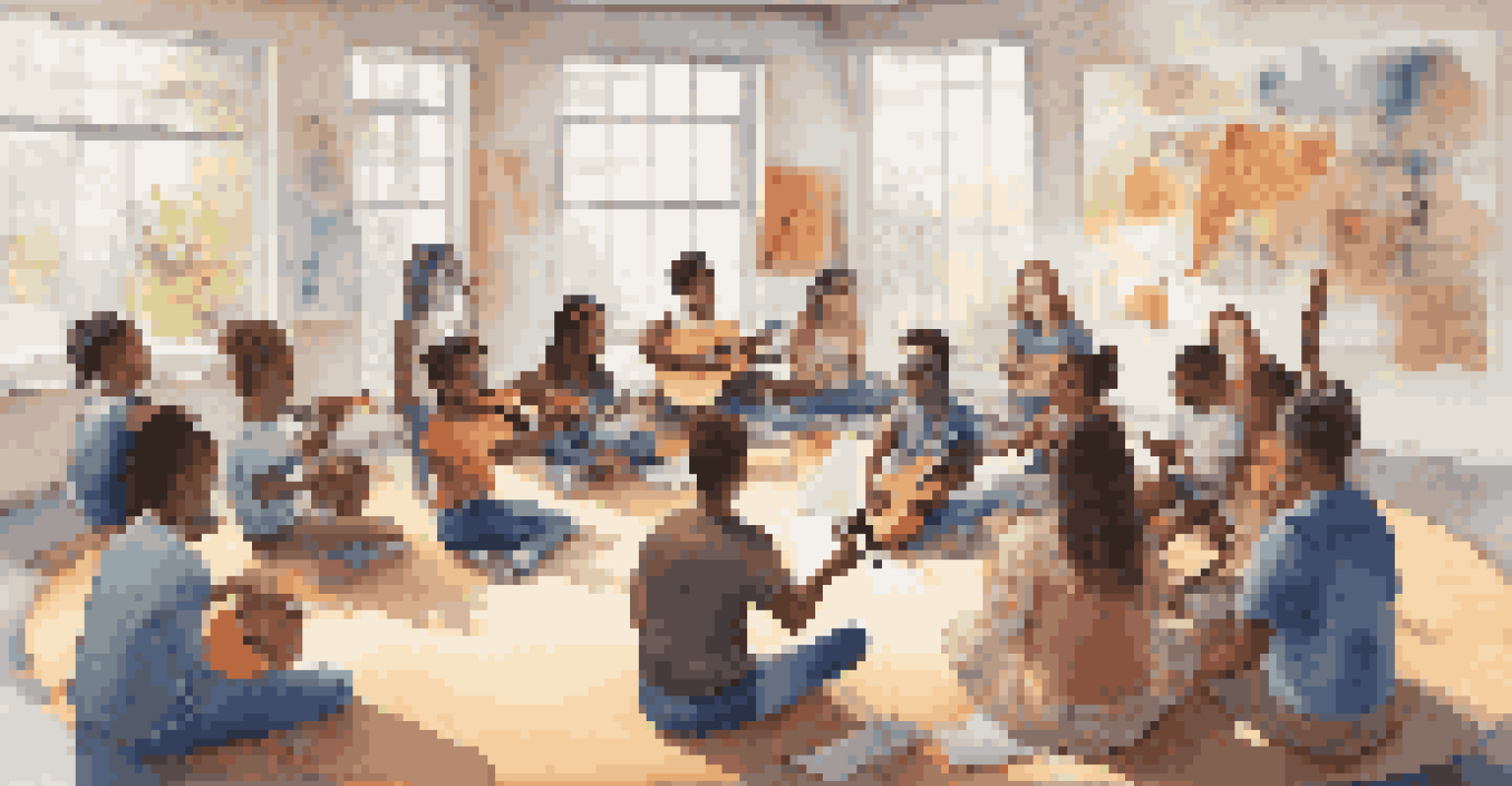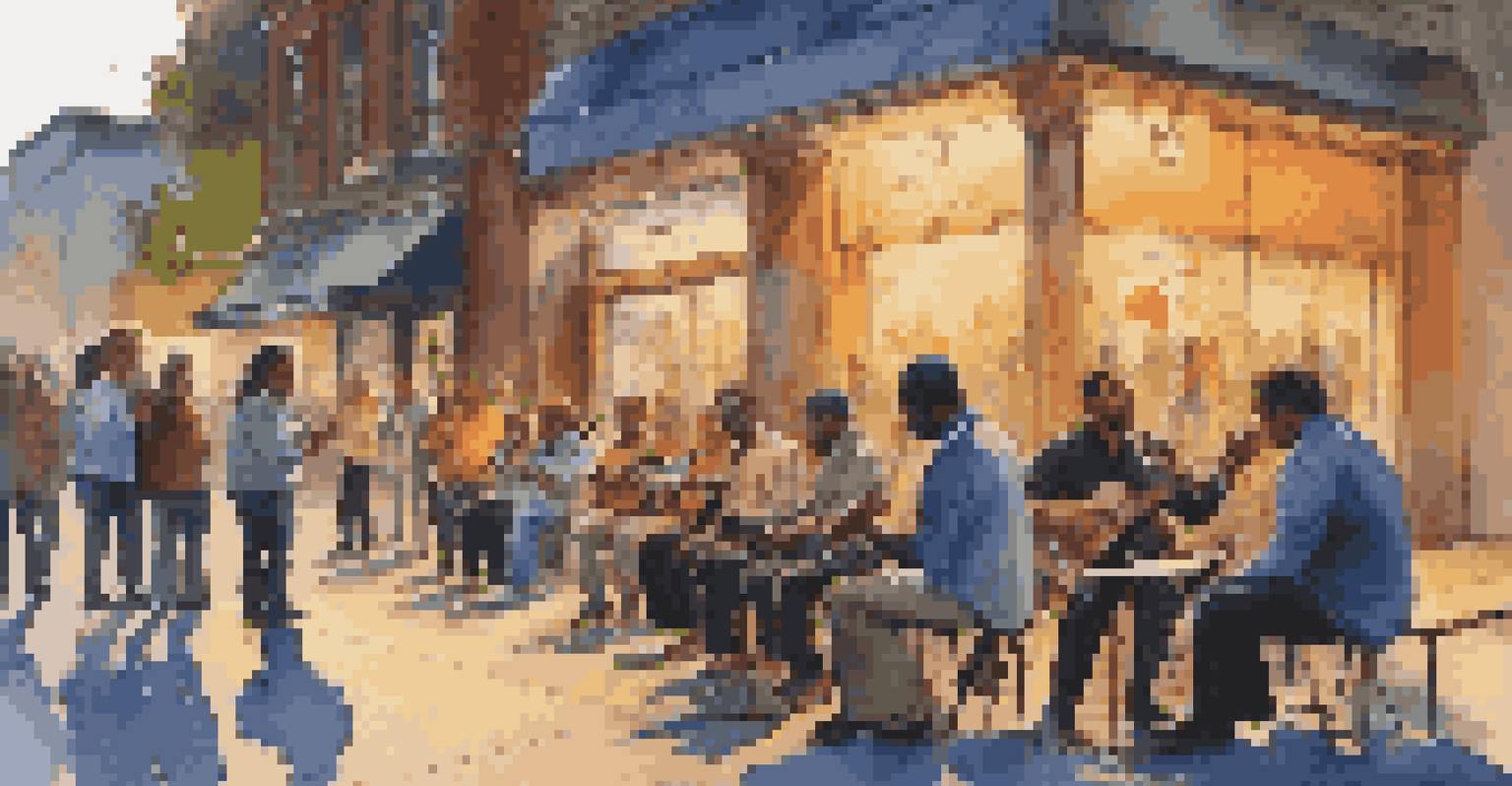Harnessing Music for Social Change in Conflict Areas

The Power of Music in Conflict Resolution
Music has long been a universal language, transcending barriers and uniting people. In conflict areas, it can serve as a powerful tool for resolution and understanding. When communities come together to create or listen to music, they often find common ground that might otherwise seem impossible.
Music can change the world because it can change people.
For instance, a peace concert in a war-torn region can draw people from opposing sides, fostering dialogue and empathy. By sharing personal stories through song, artists can challenge perceptions and encourage healing. This collective experience can help to mend the rifts that conflict has caused.
Moreover, music can evoke emotions that words sometimes fail to convey. It can inspire hope, resilience, and a sense of belonging, crucial elements for communities trying to rebuild after turmoil. Ultimately, it’s about harnessing this power to promote peace and understanding.
Music as a Tool for Healing Trauma
In areas affected by conflict, trauma is a heavy burden that many carry. Music therapy has emerged as an innovative approach to help individuals process their experiences and emotions. Research shows that engaging with music can reduce symptoms of anxiety and depression, providing a safe outlet for expression.

For example, workshops that incorporate songwriting and performance can empower participants to share their stories. This process not only aids in personal healing but also fosters a sense of community as shared experiences are vocalized. It’s a reminder that they are not alone in their struggles.
Music Bridges Divides in Conflict
Collaborative music projects unite diverse musicians, fostering dialogue and understanding in conflict-affected regions.
Additionally, the rhythm and melodies can have a calming effect, often leading to a healthier mental state. When individuals find solace through music, it can catalyze broader social change, encouraging others to seek support and break the cycle of trauma that conflict creates.
Building Bridges Through Collaborative Music Projects
Collaborative music projects are instrumental in bridging divides in conflict areas. By bringing together musicians from diverse backgrounds, these initiatives can demonstrate the beauty of unity amidst chaos. They often result in unique musical fusions that reflect the richness of different cultures coming together.
Where words fail, music speaks.
A notable example is the 'Playing for Change' movement, which connects musicians globally to promote peace and understanding. These collaborations not only create beautiful music but also foster friendships and respect among participants. When people create something beautiful together, it can shift their perceptions and lay the groundwork for lasting change.
Such projects often extend beyond the music itself, incorporating elements like workshops and community gatherings. These events cultivate a sense of belonging and shared purpose, reinforcing the idea that music can be a catalyst for social harmony.
The Role of Local Musicians in Advocacy
Local musicians play a crucial role in advocating for social change in conflict regions. Their intimate knowledge of the community’s struggles allows them to write songs that resonate deeply with their audience. This authenticity can inspire action and encourage listeners to engage with local issues.
For instance, musicians can use their platforms to raise awareness about human rights violations or promote peace initiatives through their lyrics. When songs echo the sentiments of a community, they can galvanize support and motivate individuals to join movements for change. A powerful song can become a rallying cry for justice and unity.
Healing Trauma Through Music Therapy
Music therapy helps individuals process trauma, reduce anxiety, and find community support through shared experiences.
Furthermore, local musicians often have the ability to connect with their communities on a personal level. This connection fosters trust, making their messages more impactful. Ultimately, these artists are not just entertainers; they are vital voices for change.
Youth Engagement Through Music Education
Music education can be a transformative tool for youth in conflict areas. By providing young people with the skills to create and perform, they can channel their energy into something positive. This engagement helps to cultivate a sense of purpose and belonging, diverting attention away from violence.
Programs that teach music not only nurture talent but also promote teamwork and collaboration. As students work together to create music, they learn valuable social skills and build lasting friendships. This camaraderie can strengthen community ties, making it more resilient against conflict.
Moreover, music education can serve as a platform for discussing important social issues. Workshops that incorporate discussions around peace and conflict resolution can empower youth to use their voices for advocacy. When young people feel heard and valued, they are more likely to contribute positively to their communities.
Global Support: How Organizations Foster Musical Initiatives
Numerous organizations are dedicated to using music as a vehicle for social change in conflict areas. These groups provide resources, training, and support to local musicians and communities. Their work often focuses on creating safe spaces where people can express themselves freely through music.
For instance, organizations like 'Musicians Without Borders' offer training programs that equip local artists with the skills to lead community music initiatives. This not only empowers the artists but also ensures that the impact is sustainable. By investing in local talent, these organizations help nurture a culture of peace and resilience.
Local Musicians Advocate for Change
Local musicians use their authentic voices to raise awareness and inspire action on social issues within their communities.
Additionally, these global efforts often connect local musicians with international artists, promoting cross-cultural exchanges that enrich both sides. Such collaborations can amplify messages of hope and solidarity, showing that music has the power to transcend borders and unite people.
The Future of Music for Social Change
As we look ahead, the potential for music to drive social change in conflict areas remains vast. With the rise of technology, musicians can now reach wider audiences, sharing their messages of peace and unity on a global scale. Social media platforms have become powerful tools for advocacy, allowing artists to connect with supporters and fellow activists.
Moreover, the increasing recognition of music therapy in mental health initiatives highlights its importance in healing and rebuilding communities. As more organizations invest in musical programs, we can expect to see a growing movement that harnesses the power of music for social good. It’s a promising future where harmony can emerge from chaos.

Ultimately, the journey towards peace is a collective effort, and music will continue to play a vital role. By supporting musicians and their initiatives, we can contribute to a more harmonious world, one note at a time.